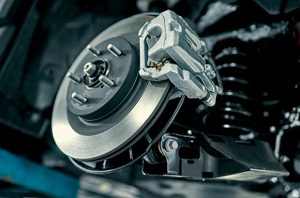What Brake Calipers Are and Why They Matter at Meineke in San Marcos
In San Marcos, where drivers cruise along I-35, head toward the San Marcos River, or also navigate busy Hopkins Street, your brakes face constant use in both city traffic and highway conditions. Therefore, keeping your brake calipers in top shape is essential for safety, performance, and long-term vehicle reliability. Because calipers are the part that presses your brake pads against the rotors, they directly control stopping power and overall brake health.
At Meineke in San Marcos, we know that well-maintained calipers can mean the difference between a smooth stop and a dangerous situation. So, here’s what you need to know—what brake calipers are, how they work, why they’re important, how to maintain them, and when to visit our trusted team.
What Brake Calipers Are
To begin with, brake calipers are a critical component of your vehicle’s disc brake system. Because they hold the brake pads and use hydraulic pressure to press them against the rotors, they create the friction needed to slow your car. Additionally, they are built to withstand intense heat and pressure every time you drive.
How Brake Calipers Work
First, when you press the brake pedal, brake fluid moves through the brake lines to the caliper. Then, the hydraulic pressure pushes the caliper’s pistons outward, pressing the brake pads against the spinning rotor. As a result, friction is created, which slows the wheel’s rotation and brings your vehicle to a stop. Finally, when you release the pedal, the pistons retract, allowing the pads to move away from the rotor.
Why Brake Calipers Are Important
Clearly, your brake calipers are essential for safe and consistent braking. For starters, they ensure even braking pressure, which keeps your car stable while slowing down. Furthermore, they help prevent uneven brake pad wear, which can reduce braking efficiency and cause vibrations. Additionally, they protect the rest of your brake system from unnecessary wear. Since brake calipers influence every stop you make, keeping them in great condition is critical for your safety and for passing Texas safety inspections.
How to Maintain Brake Calipers
Fortunately, you can extend the life of your brake calipers with consistent care:
-
Always have your brakes inspected during scheduled maintenance visits.
-
Then, replace brake pads before they wear too thin and damage the calipers.
-
Regularly check for any leaks in your brake fluid lines.
-
If you notice uneven braking, schedule a caliper inspection immediately.
-
Visit Meineke in San Marcos for professional brake cleaning and lubrication.
Because these steps reduce wear on the calipers, they also help your entire brake system last longer.
When to See a Mechanic at Meineke in San Marcos
Although brake calipers are durable, they can still develop problems over time. So, it’s time to visit Meineke in San Marcos if:
-
Suddenly, your car pulls to one side when braking.
-
Recently, you’ve heard grinding or squealing noises while stopping.
-
Lately, your brake pedal feels soft or spongy.
-
Consistently, you’ve noticed uneven brake pad wear.
-
After driving, you smell burning near the wheels.
Since addressing caliper problems early can prevent costly brake repairs, timely service is always the best choice.

So, Call Meineke in San Marcos Today for Expert Brake Service
Because your brake calipers are at the heart of your vehicle’s stopping system, keeping them in great condition is critical for safe driving. At Meineke in San Marcos, our ASE-certified technicians use advanced tools and proven techniques to inspect, repair, or replace your calipers. Whether you’re hearing strange brake noises or just want peace of mind, we’ve got you covered.
So, call Meineke in San Marcos today for a quick check-up—and keep your stopping power strong on every road ahead.
If the Meineke in San Marcos is not a convenient auto repair center for you, Meineke also has 11 car repair centers is Texas:

